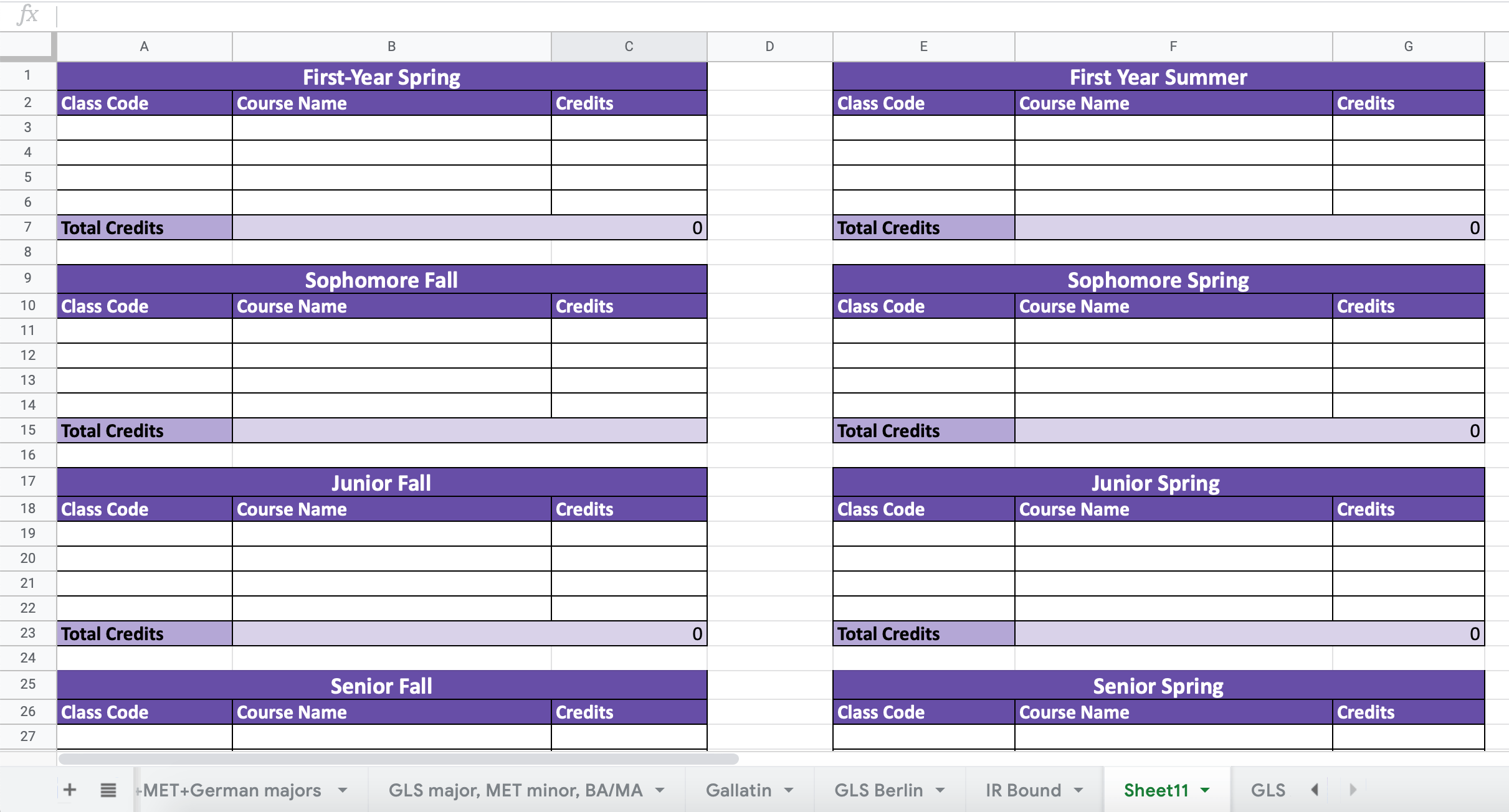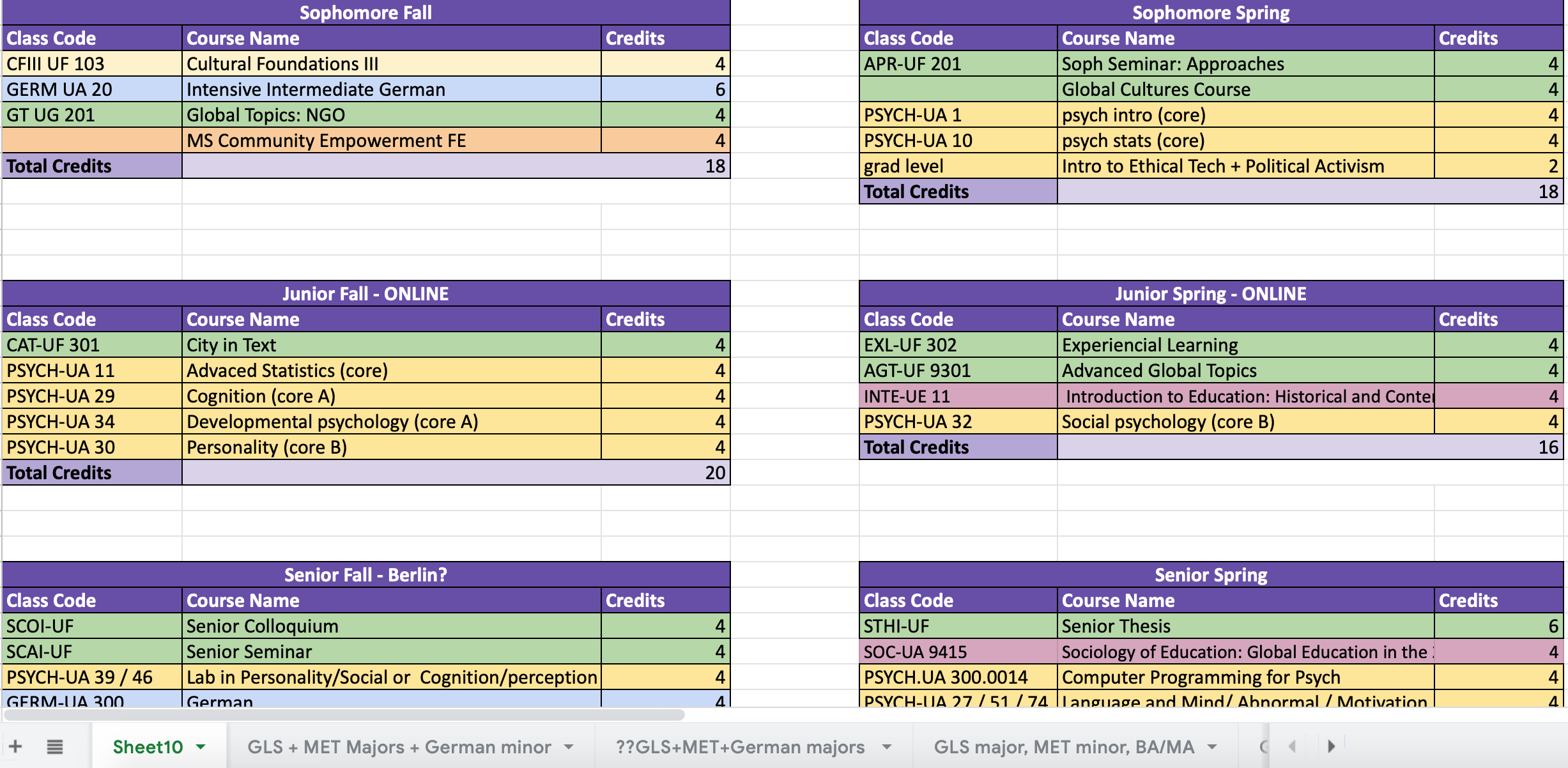Published November 17, 2020
How to Change Your Major 7 Times and Still Be on Track to Double-Major

This just goes to show how lost and confused I was as a first-year student. Coming to NYU, I was set on majoring in International Relations (IR). However, I realized that the seminar-style classrooms I engaged in during my time in the Liberal Studies Core made me more curious and motivated to learn. So, I changed my major to Global Liberal Studies (GLS) with a concentration in politics, rights, and development because it embraced the small classroom environment, had a tightly knit community of faculty and students, and closely resembled the IR program. Then, I thought it would be a good idea to major in Linguistics since language learning always piqued my interest. During this time, I also discovered the Gallatin School of Individualized Study, and it seemed like the place to be. Metropolitan Studies, Data Science, Anthropology, and then GLS again. You get the point: I couldn’t decide.
Good news: I am not the only one with so many turns and switches in my potential career paths.
Explore Your Options, but Have a Plan!
Luckily, NYU gives you an opportunity to explore and try different things, whether through the core classes or elective spaces. Since the possibilities are endless (and appealing), it is important to not get stuck in the “exploration” stage. Good news: every NYU student has an academic adviser who works with them to develop a road map for their undergraduate career. However, you can also do it yourself (and you should)! Below are some things I wish I knew about academic planning as both a prospective and first-year student.
Let’s Start with Why!
1. You can use the core classes to your advantage
Although I enjoyed my core classes, which, by the way, helped me decide on a major, I know that some might find the core liberal requirements do not align with their interests. So the solution is plain and simple: do your research. When building an academic plan, read course descriptions on NYU’s public course search, NYU Albert. Do any of them sound similar to the core classes you have to take? Most likely. So the next step is to email your adviser and ask if you can take class X to meet a certain core requirement. The answer could be yes, so just ask away. Your advisers are there to help you! By doing so, you allocate your time and financial resources effectively while learning something that interests you.
2. Some courses can count twice
For instance, when I changed my major to Metropolitan Studies, I took a class called Community Empowerment. Although I am no longer majoring in Metropolitan Studies, the course now counts toward my Global and Urban Education Studies minor. Every department has different policies, so it is always good to check to make sure that you are utilizing your credits as effectively as possible.
How Can You Build an Academic Plan on Your Own?
1. Research and narrow down the possible majors that interest you
Maybe there are two or five. Look into course descriptions for these majors as this might help you narrow down your options. Then, make a list of all the course requirements for a specific major(s). I suggest you organize your findings (in Word, Excel, or Pages—whatever works for you; I have attached the table I used below) to help you keep track.

2. Watch out for prerequisites!
Be careful with courses that have prerequisites or ones that need to be taken in a certain order. Make sure to fill those in the table first, especially if they are required for your degree.
3. The fun part: electives (and core requirements)!
Then fill out the electives for your major, followed by the core requirements. There are certain core classes that you are required to take during your first-year depending on each school (e.g., First-Year Seminar at the College of Arts and Science), so make sure your plan reflects that.
4. Want to study away?
If you want to study away, take a look at all of the 14 different global sites NYU offers. Some sites might offer classes that allow you to work toward your degree when you are away. Usually, people study away for only one semester, but two semesters abroad is also possible! Before you decide, check if your desired site has classes in your intended major(s) or minor(s).
5. Any elective space left?
See how many spaces you have remaining! Maybe you can fit another major? Or a minor? Or change your single major to a joint major? Are there some courses that double count? Are there some courses that you simply want to explore and learn more about? You have the freedom to do it all.
6. Double-check your plan with your adviser!
Send your potential academic schedule to your adviser to be sure that you did everything correctly. You can also schedule a meeting or stop by during their drop-in hours.
7. Several majors = several academic plans?
Make academic plans for all majors that interest you. That way you always have a back-up plan and you don’t need to worry about taking classes over the summer or during January Term.
Here is an example of my current color-coded academic plan for some inspiration.

Be open to change! You grow, you learn, you develop. Perhaps for most of you, it will be your first time living alone in a different place or even a different country. You will learn a lot about yourself and your passions. And it is OK if your final plan differs from your original one. Keep an open mind and don’t lock yourself to one thing, one major, person. Life is dynamic, and you are too. Embrace it, and you will be surprised.



